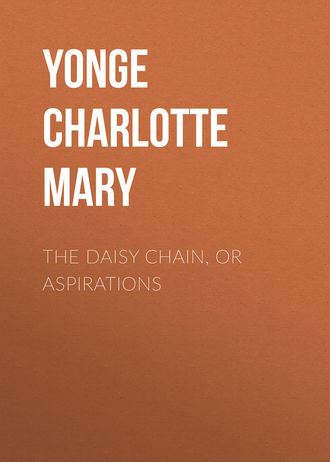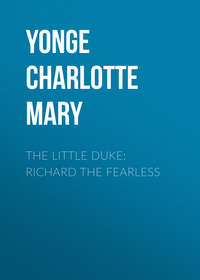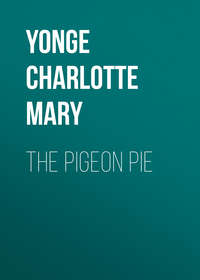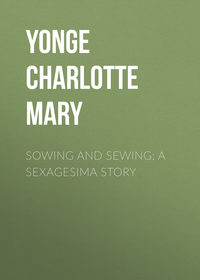
The Daisy Chain, or Aspirations
CHAPTER IX
While I, thy dearest, sat apart, And felt thy triumphs were as mine, And lov’d them more than they were thine.TENNYSON.That was a week of weeks; the most memorable week in Ethel’s life, spent in indefatigable sight-seeing. College Chapels, Bodleian Library, Taylor Gallery, the Museum, all were thoroughly studied, and, if Flora had not dragged the party on, in mercy to poor George’s patience, Ethel would never have got through a day’s work.
Indeed, Mr. Ogilvie, when annoyed at being hurried in going over Merton Chapel with her, was heard to whisper that he acted the part of policeman, by a perpetual “move on”; and as Ethel recollected the portly form and wooden face of the superintendent at Stoneborough, she was afraid that the comparison would not soon be forgotten. Norman Ogilvie seemed to consider himself bound to their train as much as his namesake, or, as on the second morning, Norman reported his reasoning, it was that a man must walk about with somebody on Commemoration week, and that it was a comfort to do so with ladies who wore their bonnets upon their heads, instead of, like most of those he met, remind him of what Cock Robin said to Jenny Wren in that matrimonial quarrel, when
Robin, he grew angry, Hopped upon a twig—Flora was extremely delighted, and, in matronly fashion, told her sister that people were always respected and admired who had the strength of mind to resist unsuitable customs. Ethel laughed in answer, and said she thought it would take a great deal more strength of mind to go about with her whole visage exposed to the universal gaze; and, woman-like, they had a thorough gossip over the evils of the “backsliding” head-gear.
Norman had retreated from it into the window, when Flora returned to the charge about Harvey Anderson. She had been questioning their old friend Mr. Everard, and had learned from him that the cause of the hesitation with which his name had been received was that he had become imbued with some of the Rationalistic ideas current in some quarters. He seldom met Norman May without forcing on him debates, which were subjects of great interest to the hearers, as the two young men were considered as the most distinguished representatives of their respective causes, among their own immediate contemporaries. Norman’s powers of argument, his eloquence, readiness, and clearness, were thought to rank very high, and, in the opinion of Mr. Everard, had been of great effect in preventing other youths from being carried away by the specious brilliancy of his rival.
Ethel valued this testimony far above the Newdigate prize, and she was extremely surprised by hearing Flora declare her intention of still asking Mr. Anderson to dinner, only consulting her brother as to the day.
“Why, Flora! ask him! Norman—”
Norman had turned away with the simple answer, “any day.”
“Norman is wiser than you are, Ethel,” said Flora. “He knows that Stoneborough would be up in arms at any neglect from us to one of the Andersons, and, considering the rivalship, it is the more graceful, and becoming.”
“I do not think it right,” said Ethel stoutly; “I believe that a line ought to be drawn, and that we ought not to associate with people who openly tamper with their faith.”
“Never fear,” smiled Flora; “I promise you that there shall be no debates at my table.”
Ethel felt the force of the pronoun, and, as Flora walked out of the room, she went up to Norman, who had been resting his brow against the window.
“It is vain to argue with her,” she said; “but, Norman, do not you think it is clearly wrong to seek after men who desert and deny—”
She stopped short, frightened at his pale look.
He spoke in a low clear tone that seemed to thrill her with a sort of alarm. “If the secrets of men’s hearts were probed, who could cast the first stone?”
“I don’t want to cast stones,” she began; but he made a gesture as if he would not hear, and, at the same moment, Mr. Ogilvie entered the room.
Had Ethel been at home, she would have pondered much over her brother’s meaning—here she had no leisure. Not only was she fully occupied with the new scenes around her, but her Scottish cousin took up every moment open to conversation. He was older than Norman, and had just taken his degree, and he talked with that superior aplomb, which a few years bestow at their time of life, without conceit, but more hopeful and ambitious, and with higher spirits than his cousin.
Though industrious and distinguished, he had not avoided society or amusement, was a great cricketer and tennis-player, one of the “eight” whose success in the boat races was one of Norman’s prime interests, and he told stories of frolics that reminded Ethel of her father’s old Cambridge adventures.
He was a new variety in her eyes, and entertained her greatly. Where the bounds of banter ended, was not easy to define, but whenever he tried a little mystification, she either entered merrily into the humour, or threw it over with keen wit that he kept constantly on the stretch. They were always discovering odd, unexpected bits of knowledge in each other, and a great deal more accordance in views and opinions than appealed on the surface, for his enthusiasm usually veiled itself in persiflage on hers, though he was too good and serious to carry it too far.
At Blenheim, perhaps he thought he had given an overdose of nonsense, and made her believe, as Meta really did, that the Duchess Sarah was his model woman; for as they walked in the park in search of Phoebe Mayflower’s well, he gathered a fern leaf, to show her the Glenbracken badge, and talked to her of his home, his mother, and his sister Marjorie, and the little church in the rocky glen. He gave the history of the stolen meetings of the little knot of churchmen during the days of persecution, and showed a heart descended straight from the Ogilvie who was “out with Montrose,” now that the upper structure of young England was for a little while put aside.
After this, she took his jokes much more coolly, and made thrusts beneath them, which he seemed to enjoy, and caused him to unfold himself the more. She liked him all the better for finding that he thought Norman had been a very good friend to him, and that he admired her brother heartily, watching tenderly over his tendencies to make himself unhappy. He confided to her that, much as he rejoiced in the defeats of Anderson, he feared that the reading and thought consequent on the discussions, had helped to overstrain Norman’s mind, and he was very anxious to carry him away from all study, and toil, and make his brains rest, and his eyes delight themselves upon Scottish mountains.
Thereupon came vivid descriptions of the scenery, especially his own glen with the ruined tower, and ardent wishes that his cousin Ethel could see them also, and know Marjorie. She could quite echo the wish, Edinburgh and Loch Katrine had been the visions of her life, and now that she had once taken the leap and left home, absence did not seem impossible, and, with a start of delight, she hailed her own conviction that he intended his mother to invite the party to Glenbracken.
After Norman’s visit, Mr. Ogilvie declared that he must come home with him and pay his long-promised visit to Stoneborough. He should have come long ago. He had been coming last winter, but the wedding had prevented him; he had always wished to know Dr. May, whom his father well remembered, and now nothing should keep him away!
Flora looked on amused and pleased at Ethel’s development—her abruptness softened into piquancy, and her countenance so embellished, that the irregularity only added to the expressiveness. There was no saying what Ethel would come to! She had not said that she would not go to the intended ball, and her grimaces at the mention of it were growing fainter every day.
The discussion about Harvey Anderson was never revived; Flora sent the invitation without another word—he came with half a dozen other gentlemen—Ethel made him a civil greeting, but her head was full of boats and the procession day, about which Mr. Ogilvie was telling her, and she thought of him no more.
“A lucky step!” thought Flora. “A grand thing for Ethel—a capital connection for us all. Lady Glenbracken will not come too much into my sphere either. Yes, I am doing well by my sisters.”
It would make stay-at-home people giddy to record how much pleasure, how much conversation and laughter were crowded into those ten days, and with much thought and feeling beside them, for these were not girls on whom grave Oxford could leave no impression but one of gaiety.
The whole party was very full of merriment. Norman May, especially, on whom Flora contrived to devolve that real leadership of conversation that should rightly have belonged to George Rivers, kept up the ball with wit and drollery far beyond what he usually put forth; enlivened George into being almost an agreeable man, and drew out little Meta’s vivacity into sunny sparkles.
Meta generally had Norman for her share, and seemed highly contented with his lionisings, which were given much more quietly and copiously than those which his cousin bestowed upon his sister. Or if there were anything enterprising to be done, any tower to be mounted, or anything with the smallest spice of danger in it, Meta was charmed, and with her lightness and airiness of foot and figure, and perfectly feminine ways, showed a spirit of adventure that added to the general diversion. But if she were to be helped up or down anywhere, she certainly seemed to find greater security in Norman May’s assistance, though it was but a feather-like touch that she ever used to aid her bounding step.
Both as being diffident, and, in a manner at home, Norman was not as constantly her cavalier as was Mr. Ogilvie to his sister; and, when supplanted, his wont was either to pioneer for Flora, or, if she did not need him, to walk alone, grave and abstracted. There was a weight on his brow, when nothing was going on to drive it away, and whether it were nervousness as to the performance in store for him, anxiety about Harry, or, as Mr. Ogilvie said, too severe application; some burden hung upon him, that was only lightened for the time by his participation in the enjoyment of the party.
On Sunday evening, when they had been entering into the almost vision-like delight of the choicest of music, and other accompaniments of church service, they went to walk in Christchurch Meadows. They had begun altogether by comparing feelings—Ethel wondering whether Stoneborough Minster would ever be used as it might be, and whether, if so, they should be practically the better for it; and proceeding with metaphysics on her side, and satire on Norman Ogilvie’s, to speculate whether that which is, is best, and the rights and wrongs of striving for change and improvements, what should begin from above, and what from beneath—with illustrations often laughter-moving, though they were much in earnest, as the young heir of Glenbracken looked into his future life.
Flora had diverged into wondering who would have the living after poor old Mr. Ramsden, and walked, keeping her husband amused with instances of his blunders.
Meta, as with Norman she parted from the rest, thought her own dear Abbotstoke church, and Mr Charles Wilmot, great subjects for content and thanksgiving, though it was a wonderful treat to see and hear such as she had enjoyed to-day; and she thought it was a joy, to carry away abidingly, to know that praise and worship, as near perfection as this earth could render them, were being offered up.
Norman understood her thought, but responded by more of a sigh than was quite comfortable.
Meta went on with her own thoughts, on the connection between worship and good works, how the one leads to the other, and how praise with pure lips is, after all, the great purpose of existence.—Her last thought she spoke aloud.
“I suppose everything, our own happiness and all, are given to us to turn into praise,” she said.
“Yes—” echoed Norman; but as if his thoughts were not quite with hers, or rather in another part of the same subject; then recalling himself, “Happy such as can do so.”
“If one only could—” said Meta.
“You can—don’t say otherwise,” exclaimed Norman; “I know, at least, that you and my father can.”
“Dr. May does so, more than any one I know,” said Meta.
“Yes,” said Norman again; “it is his secret of joy. To him, it is never, I am half sick of shadows.”
“To him they are not shadows, but foretastes,” said Meta. Silence again; and when she spoke, she said, “I have always thought it must be such a happiness to have power of any kind that can be used in direct service, or actual doing good.”
“No,” said Norman. “Whatever becomes a profession, becomes an unreality.”
“Surely not, in becoming a duty,” said Meta.
“Not for all,” he answered; “but where the fabric erected by ourselves, in the sight of the world, is but an outer case, a shell of mere words, blown up for the occasion, strung together as mere language; then, self-convicted, we shrink within the husk, and feel our own worthlessness and hypocrisy.”
“As one feels in reproving the school children for behaving ill at church?” said Meta.
“You never felt anything approaching to it!” said Norman. “To know oneself to be such a deception, that everything else seems a delusion too!”
“I don’t know whether that is metaphysical,” said Meta, “but I am sure I don’t understand it. One must know oneself to be worse than one knows any one else to be.”
“I could not wish you to understand,” said Norman; and yet he seemed impelled to go on; for, after a hesitating silence, he added, “When the wanderer in the desert fears that the spring is but a mirage; or when all that is held dear is made hazy or distorted by some enchanter, what do you think are the feelings, Meta?”
“It must be dreadful,” she said, rather bewildered; “but he may know it is a delusion, if he can but wake. Has he not always a spell, a charm?—”
“What is the spell?” eagerly said Norman, standing still.
“Believe—” said Meta, hardly knowing how she came to choose the words.
“I believe!” he repeated. “What—when we go beyond the province of reason—human, a thing of sense after all! How often have I so answered. But Meta, when a man has been drawn, in self-sufficient security, to look into a magic mirror, and cannot detach his eyes from the confused, misty scene—where all that had his allegiance appears shattered, overthrown, like a broken image, or at least unable to endure examination, then—”
“Oh, Norman, is that the trial to any one here? I thought old Oxford was the great guardian nurse of truth! I am sure she cannot deal in magic mirrors or such frightful things. Do you know you are talking like a very horrible dream?”
“I believe I am in one,” said Norman.
“To be sure you are. Wake!” said Meta, looking up, smiling in his face. “You have read yourself into a maze, that’s all—what Mary calls, muzzling your head; you don’t really think all this, and when you get into the country, away from books, you will forget it. One look at our dear old purple Welsh hills will blow away all the mists!”
“I ought not to have spoken in this manner,” said Norman sadly. “Forget it, Meta.”
“Forget it! Of course I will. It is all nonsense, and meant to be forgotten,” said Meta, laughing. “You will own that it is by-and-by.”
He gave a deep sigh.
“Don’t think I am unfeeling,” she said; “but I know it is all a fog up from books, books, books—I should like to drive it off with a good fresh gust of wind! Oh! I wish those yellow lilies would grow in our river!”
Meta talked away gaily for the rest of the walk. She was anything but unfeeling, but she had a confidence in Norman that forbade her to see anything here but one of his variations of spirits, which always sank in the hour of triumph. She put forth her brightness to enliven him, and, in their subsequent tete-a-tetes, she avoided all that could lead to a renewal of this conversation. Ethel would not have rested till it had been fought out. Meta thought it so imaginary, that it had better die for want of the aliment of words; certainly, hers could not reach an intellect like his, and she would only soothe and amuse him. Dr. May, mind-curer as well as body-curer, would soon be here, to put the climax to the general joy and watch his own son.
He did arrive; quite prepared to enjoy, giving an excellent account of both homes; Mr. Rivers very well, and the Wilmots taking care of him, and Margaret as comfortable as usual, Mary making a most important and capable little housekeeper, Miss Bracy as good as possible. He talked as if they had all nourished the better for Ethel’s absence, but he had evidently missed her greatly, as he showed, without knowing it, by his instant eagerness to have her to himself. Even Norman, prizeman as he was, was less wanted. There was proud affection, eager congratulation, for him, but it was Ethel to whom he wanted to tell everything that had passed during her absence—whom he treated as if they were meeting after a tedious separation.
They dined rather early, and went out afterwards, to walk down the High Street to Christchurch Meadow. Norman and Ethel had been anxious for this; they thought it would give their father the best idea of the tout ensemble of Oxford, and were not without hopes of beating him by his own confession, in that standing fight between him and his sons, as to the beauties of Oxford and Cambridge—a fight in which, hitherto, they had been equally matched—neither partisan having seen the rival University.
Flora stayed at home; she owned herself fairly tired by her arduous duties of following the two young ladies about, and was very glad to give her father the keeping of them. Dr. May held out his arm to Ethel—Norman secured his peculiar property. Ethel could have preferred that it should be otherwise—Norman would have no companion but George Rivers; how bored he would be!
All through the streets, while she was telling her father the names of the buildings, she was not giving her whole attention; she was trying to guess, from the sounds behind, whether Mr. Ogilvie were accompanying them. They entered the meadows—Norman turned round, with a laugh, to defy the doctor to talk of the Cam, on the banks of the Isis. The party stood still—the other two gentlemen came up. They amalgamated again—all the Oxonians conspiring to say spiteful things of the Cam, and Dr. May making a spirited defence, in which Ethel found herself impelled to join.
In the wide gravelled path, they proceeded in threes; George attached himself to his sister and Norman. Mr. Ogilvie came to Ethel’s other side, and began to point out all the various notabilities. Ethel was happy again; her father was so much pleased and amused, with him, and he with her father, that it was a treat to look on.
Presently Dr. May, as usual, always meeting with acquaintances, fell in with a county neighbour, and Ethel had another pleasant aside, until her father claimed her, and Mr. Ogilvie was absorbed among another party, and lost to her sight.
He came to tea, but, by that time, Dr. May had established himself in the chair which had hitherto been appropriated to her cousin, a chair that cut her nook off from the rest of the world, and made her the exclusive possession of the occupant. There was a most interesting history for her to hear, of a meeting with the Town Council, which she had left pending, when Dr. May had been battling to save the next presentation of the living from being sold.
Few subjects could affect Ethel more nearly, yet she caught herself missing the thread of his discourse, in trying to hear what Mr. Ogilvie was saying to Flora about a visit to Glenbracken.
The time came for the two Balliol men to take their leave. Norman May had been sitting very silent all the evening, and Meta, who was near him, respected his mood. When he said good-night, he drew Ethel outside the door. “Ethel,” he said, “only one thing: do ask my father not to put on his spectacles to-morrow.”
“Very well,” said Ethel, half smiling; “Richard did not mind them.”
“Richard has more humility—I shall break down if he looks at me! I wish you were all at home.”
“Thank you.”
The other Norman came out of the sitting-room at the moment, and heard the last words.
“Never mind,” said he to Ethel, “I’ll take care of him. He shall comport himself as if you were all at Nova Zembla. A pretty fellow to talk of despising fame, and then get a fit of stage-fright!”
“Well, good-night,” said Norman, sighing. “It will be over to-morrow; only remember the spectacles.”
Dr. May laughed a good deal at the request, and asked if the rest of the party were to be blindfolded. Meta wondered that Ethel should have mentioned the request so publicly; she was a good deal touched by it, and she thought Dr. May ought to be so.
Good-night was said, and Dr. May put his arm round Ethel, and gave her the kiss that she had missed for seven nights. It was very homelike, and it brought a sudden flash of thought across Ethel! What had she been doing? She had been impatient of her father’s monopoly of her!
She parted with Flora, and entered the room she shared with Meta, where Bellairs waited to attend her little mistress. Few words passed between the two girls, and those chiefly on the morrow’s dress. Meta had some fixed ideas—she should wear pink. Norman had said he liked her pink bonnet, and then she could put down her white veil, so that he could be certain that she was not looking; Ethel vaguely believed Flora meant to wear—something—
Bellairs went away, and Meta gave expression to her eager hope that Norman would go through it well. If he would only read it as he did last Easter to her and Ethel.
“He will,” said Ethel. “This nervousness always wears off when it comes to the point, and he warms with his subject.”
“Oh! but think of all the eyes looking at him!”
“Our’s are all that he really cares for, and he will think of none of them, when he begins. No, Meta, you must not encourage him in it. Papa says, if he did not think it half morbid—the result of the shock to his nerves—he should be angry with it as a sort of conceit!”
“I should have thought that the last thing to be said of Norman!” said Meta, with a little suppressed indignation.
“It was once in his nature,” said Ethel; “and I think it is the fault he most beats down. There was a time, before you knew him, when he would have been vain and ambitious.”
“Then it is as they say, conquered faults grow to be the opposite virtues!” said Meta. “How very good he is, Ethel; one sees it more when he is with other people, and one hears all these young men’s stories!”
“Everything Norman does not do, is not therefore wrong,” said Ethel, with her usual lucidity of expression.
“Don’t you like him the better for keeping out of all these follies?”
“Norman does not call them so, I am sure.”
“No, he is too good to condemn—”
“It is not only that,” said Ethel. “I know papa thinks that the first grief, coming at his age, and in the manner it did, checked and subdued his spirits, so that he has little pleasure in those things. And he always meant to be a clergyman, which acted as a sort of consecration on him; but many things are innocent; and I do believe papa would like it better, if Norman were less grave.”
“Yes,” said Meta, remembering the Sunday talk, “but still, he would not be all he is—so different from others—”
“Of course, I don’t mean less good, only, less grave,” said Ethel, “and certainly less nervous. But, perhaps, it is a good thing; dear mamma thought his talents would have been a greater temptation than they seem to be, subdued as he has been. I only meant that you must not condemn all that Norman does not do. Now, goodnight.”
Very different were the feelings with which those two young girls stretched themselves in their beds that night. Margaret Rivers’s innocent, happy little heart was taken up in one contemplation. Admiration, sympathy, and the exultation for him, which he would not feel for himself, drew little Meta entirely out of herself—a self that never held her much. She was proud of the slender thread of connection between them; she was confident that his vague fancies were but the scruples of a sensitive mind, and, as she fell sound asleep, she murmured broken lines of Decius, mixed with promises not to look.









